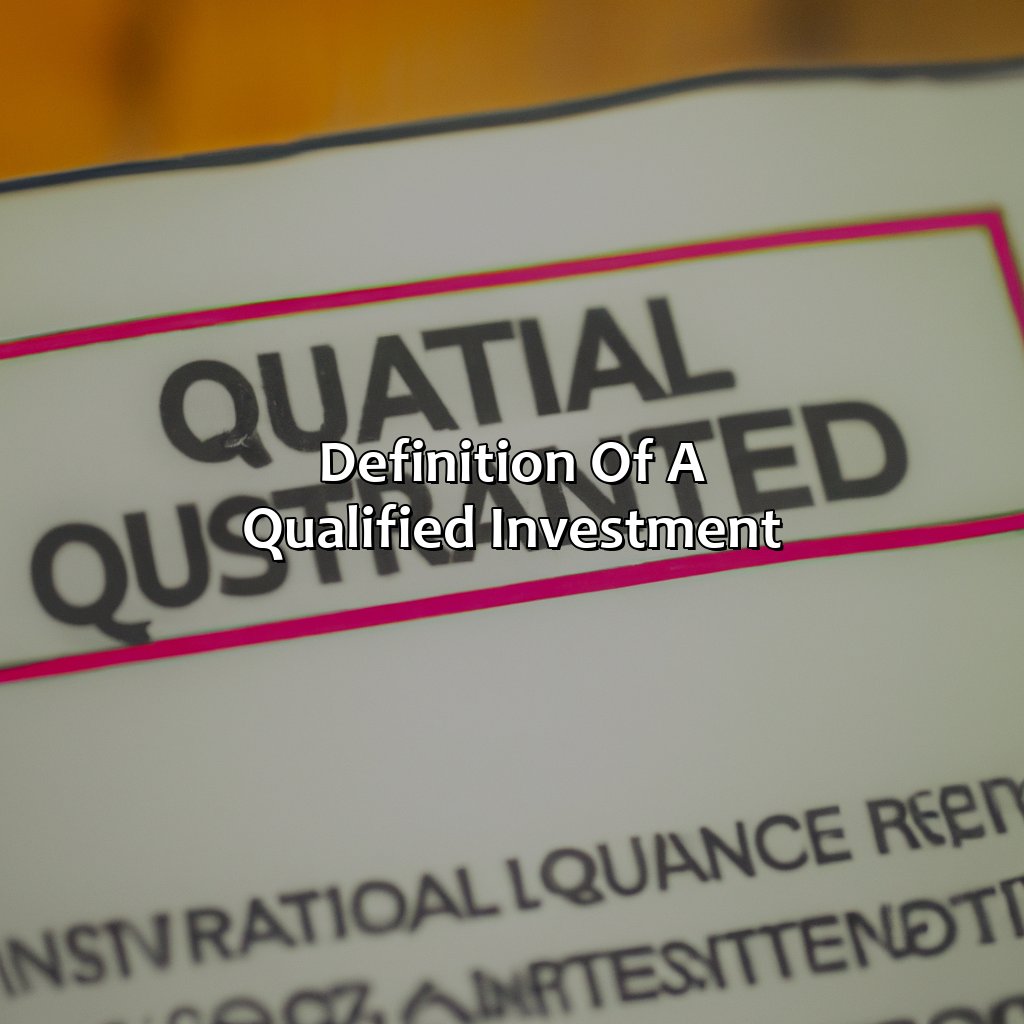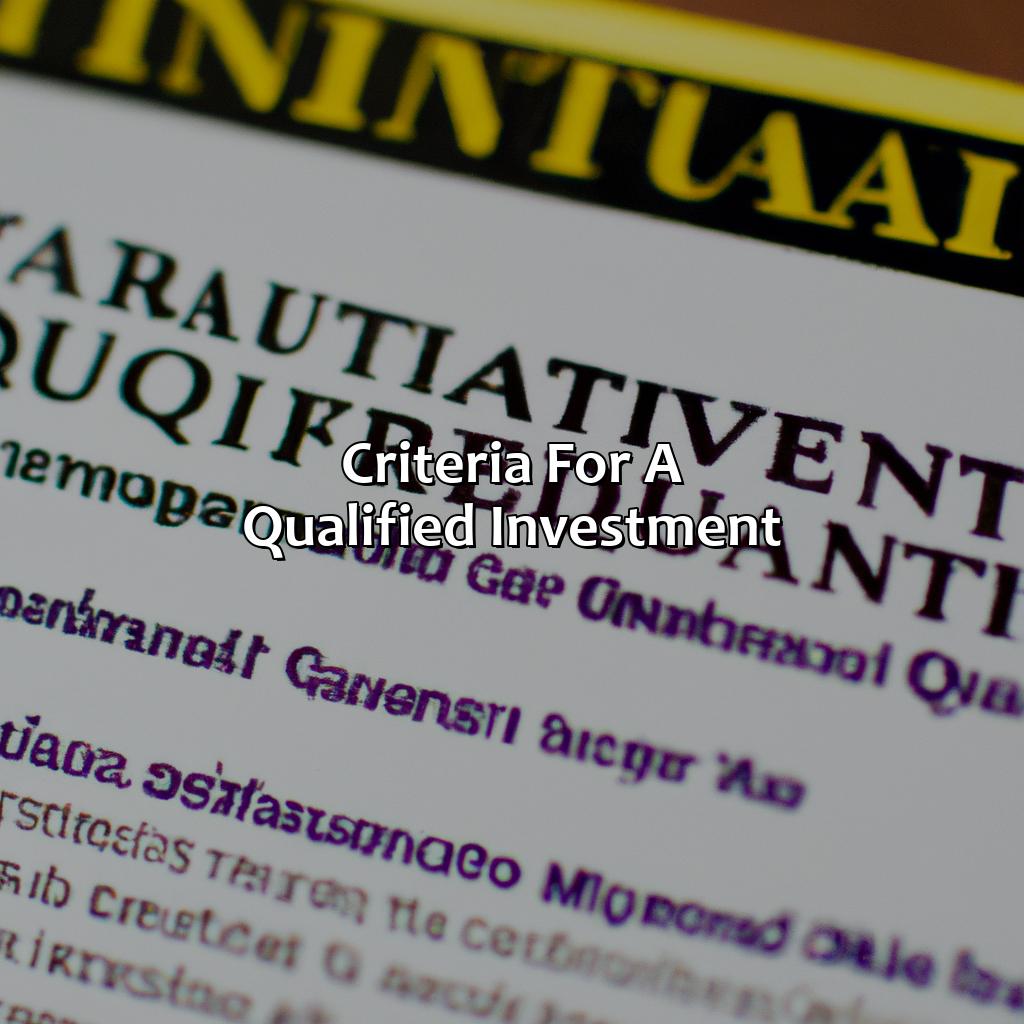What Is A Qualified Investment?
Key takeaway:
- A qualified investment is an investment that meets certain criteria established by the Internal Revenue Service (IRS).
- There are various types of qualified investments, such as securities, real estate, retirement accounts, and education accounts, each with their own specific criteria for qualification.
- To qualify as a qualified investment, the investment must meet certain criteria, such as offering tax benefits, meeting regulatory standards, and serving a specific investment purpose.
You may have heard of investments but do you know what a qualified investment is? Do you want to diversify your portfolio and maximize the rate of return on your investments? This article will provide an insight into qualified investments and how they can help you achieve your financial goals.
Definition of a Qualified Investment
A qualified investment refers to a financial vehicle that meets certain criteria set by regulatory bodies. These include stocks, bonds and real estate investments that offer tax benefits, such as 401(k)’s or individual retirement accounts. The qualification standards vary between jurisdictions. Investing in qualified investments provide long-term benefits for investors and the economy.
Investors’ interest in qualified investments is driven by the tax benefits and the long-term appreciation potential of these investments. The purpose of qualified investments is to encourage individuals to save more money and grow investments that will lessen their financial burden in retirement. A significant benefit of qualified investments is tax-deferred growth, that is, no taxes are due on gains until the investor withdraws funds from the account.
To invest in a qualified investment, one needs to meet certain requirements. For instance, the investor must have earned income or earned a certain amount of money during the year, and the contribution of the investment must come from this income and not from borrowed funds. Qualifications are necessary to prevent individuals from abusing the tax-deferrals, and to ensure that only those who are willing and able to set aside funds are receiving the benefits.
Investors who invest in qualified investments need to ensure that they are aware of the risks, associated fees, investment options, and fluctuations of the market. Investors need to conduct ample research and understand the investment vehicle they choose and the potential consequences of their choices.
In summary, qualified investments offer significant tax benefits and are attractive to investors seeking long-term appreciation potential. Investors must adequately consider the risks, fees, and fluctuations of the market while researching potential investment opportunities. Overall, qualified investments align investors’ long-term financial goals with the stability of the economy.

Image credits: retiregenz.com by James Duncun
Types of Qualified Investments
Qualified investments refer to securities or financial instruments that meet certain requirements specified by the Internal Revenue Service (IRS). These investments are eligible for preferential tax treatment, making them a popular choice among investors.
Here is a breakdown of some common types of qualified investments:
| Type of Investment | Description |
|---|---|
| 401(k) Contributions | Retirement plan contributions made through an employer that allow for pre-tax deductions from an employee’s paycheck |
| Traditional and Roth IRAs | Individual retirement accounts that offer tax advantages for contributions made to the account |
| Municipal Bonds | Bonds issued by state and local governments that offer tax-free income to investors |
| Certain Real Estate Investments | Investments made in certain types of property can offer tax advantages, such as depreciation deductions |
It’s worth noting that the rules governing qualified investments can be complex and subject to change. Working with a financial advisor can be helpful in navigating these nuances.
One important detail to keep in mind is that qualified investments are not immune to market fluctuations or investment risk. While they may offer tax benefits, investors should always consider their individual financial goals and risk tolerance when making investment decisions.
Investors looking to maximize their tax benefits may also consider charitable giving as a way to offset taxable income. By donating to qualified charities, individuals can reduce their tax liability while also supporting causes they care about.
In summary, qualified investments can offer tax advantages for investors, but it’s important to understand the rules and risks associated with these types of investments. Working with a knowledgeable financial advisor and considering charitable giving can help investors make informed decisions that align with their financial goals.

Image credits: retiregenz.com by Adam Jones
Criteria for a Qualified Investment
A Guide to Understanding Qualified Investments
A qualified investment refers to a financial asset that meets specific criteria set by the relevant regulatory bodies. To qualify, an investment must have a low risk factor and be considered a safer choice for investors. Additionally, the investment must adhere to certain guidelines and meet the required standards set by the regulatory bodies.
Various factors determine what qualifies as a qualified investment, such as the safety of the investment, its liquidity, and the taxation rules. Furthermore, qualified investments are usually associated with long-term investment goals and are considered a reliable source of income.
Typically, qualified investments are prevalent in retirement plans, such as 401(k) plans and Individual Retirement Accounts (IRA). These plans allow investors to save money for retirement and reap the tax benefits of qualified investments.
In the past, there have been instances where investments, including qualified investments, have underperformed or lost value. The failure of these investments could be tied to unforeseen market factors or even fraud. Investors should always do their research and monitor their investments to mitigate these risks.
In summary, qualifying as a qualified investment is a rigorous process, and the guidelines set by the regulatory bodies aim to protect investors. Although qualified investments have a certain degree of security, investors should still exercise caution and perform due diligence before committing to an investment.

Image credits: retiregenz.com by James Duncun
Benefits of Investing in Qualified Investments
There are several advantages of investing in investments that qualify under specific criteria. These investments can provide significant benefits for investors, including tax advantages, diversification, lower risk, and better potential returns.
- Tax advantages: Qualified investments enable investors to take advantage of various tax incentives, such as tax-free earning on interest, tax-deferred growth, and deductibility of certain investment-related expenses. They can help investors minimize their tax liability and increase their overall returns from investments.
- Diversification: Investing in qualified investments allows investors to diversify their portfolios across various sectors and asset classes. Diversification spreads risk across different investments, reducing the chances of loss due to a single investment’s performance.
- Lower risk: Qualified investments typically have lower risk profiles than other investments. They usually have established track records, are regulated by governing agencies, and have specific investment guidelines that limit their exposure to market volatility.
- Better potential returns: Qualified investments have the potential for better returns than non-qualifying investments. They often have higher yields, lower fees, and better liquidity, providing investors with excellent opportunities to earn higher returns.
In addition, some qualified investments offer unique features, such as the ability to participate in socially responsible investing or alternative investments, such as real estate or private equity.
Investors should always conduct thorough research on various qualified investment options and seek advice from investment professionals to make informed decisions. It is recommended to maintain a well-diversified portfolio and periodically review investment performance to ensure alignment with investment goals.

Image credits: retiregenz.com by Joel Duncun
Some Facts About Qualified Investments:
- ✅ A qualified investment is an investment that meets certain criteria to be eligible for tax-advantaged treatment. (Source: Investopedia)
- ✅ Certain retirement accounts, such as IRAs and 401(k)s, are considered qualified investments. (Source: The Balance)
- ✅ Qualified investments may also include municipal bonds, which offer tax-free income to investors. (Source: Forbes)
- ✅ The criteria for qualified investments may vary depending on the specific tax laws and regulations of a particular country or region. (Source: Tax Foundation)
- ✅ Investing in qualified investments can be a smart way to reduce tax liabilities and increase overall investment returns. (Source: The Motley Fool)
FAQs about What Is A Qualified Investment?
What is a qualified investment?
A qualified investment is an investment that meets certain criteria set by the tax code and allows the investor to receive tax benefits. These criteria vary depending on the type of investment and the country in which it is made.
What are some examples of qualified investments?
Some examples of qualified investments include individual retirement accounts (IRAs), 401(k) plans, and certain types of real estate investments. These investments all meet specific criteria set by the tax code and offer tax advantages to investors.
Can anyone invest in qualified investments?
In general, anyone can invest in qualified investments as long as they meet the eligibility requirements set by the investment type. For example, to invest in an IRA, the investor must have earned income and be under a certain age limit.
What are the tax benefits of investing in qualified investments?
The tax benefits of investing in qualified investments vary depending on the investment type and the country in which the investment is made. In general, these benefits can include tax-deferred growth, tax-free withdrawals, and reduced tax rates on capital gains.
Are there any risks associated with investing in qualified investments?
Like any investment, there are risks associated with investing in qualified investments. These risks can include market fluctuations, interest rate fluctuations, and other factors that can affect the value of the investment.
How can I determine if a particular investment is a qualified investment?
To determine if a particular investment is a qualified investment, you should consult with a financial advisor or tax professional. They can help you understand the specific criteria that must be met for an investment to be considered qualified and can provide guidance on the tax benefits and risks associated with the investment.
